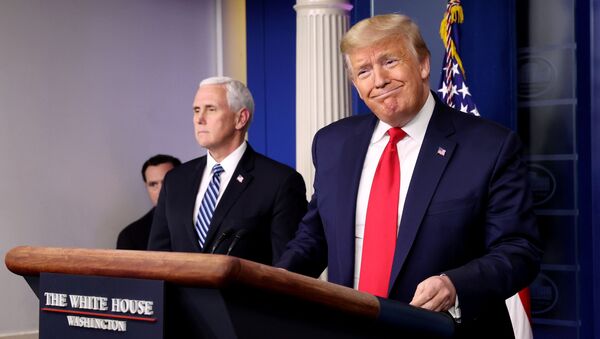Last Sunday President Donald Trump issued a major disaster declaration for Wyoming, meaning that for the first time in history Washington has declared a major disaster in all 50 states at the same time. The new status means that local governments and non-government organisations will have the opportunity to request federal funds for assistance in fighting the coronavirus outbreak.
But can this move really shift the tide for the US as the virus continues to spread among its communities at a fast pace?
Results Will Depend on Trump Administration
Introducing a state of major disaster was a good thing to do, as it demonstrates the seriousness of the threat to public health and gives additional instruments for Washington to help the affected states, Richard Vatz, a distinguished professor at Towson University, believes.
Dr Thomas Whalen, a political analyst and associate professor, agrees with Vatz, calling the decision to introduce a state of major disaster a "prudent move" on Trump's part, but notes that there is a chance that Trump's administration won't be able to utilise it properly.
"There is a strong need to coordinate a true national relief effort. Unfortunately, the Trump administration has demonstrated no such compunction, instead relying on individual states and communities to provide medical assistance", Whalen says.
The country-wide introduction of a major disaster by itself means nothing, political analyst Djene R. Bajalan argues, noting that the "devil is in the detail". He stresses that the current coronavirus crisis has already exposed structural issues in the United States when it comes to policy issues, and suggested that the actual use of the now available federal funds might not be as efficient as some expect.
Just a PR Stunt?
So does that mean that Trump's move changed nothing? Ross Baker, a professor of political science at Rutgers University, believes so, noting that most states have already declared a state of emergency in their communities. The pundit further suggests that Trump only introduced the measure as a response to accusations against him for not using his powers to their fullest extent in a time of crisis.
"The president is very much aware of his own powers, but has shown little understanding of the relationship between the national government and the states. On a day-to-day basis, the lives of Americans are much more deeply affected by the laws of the states than of the federal government", Baker sums up.
Much of the criticism directed at Trump and his reaction to the coronavirus pandemic in the US holds no water, professor Richard Vatz from Towson University believes. Vatz says that not only Trump, but also the Democrats who are scolding POTUS right now, displayed a lack of urgency towards the threat of the virus during the early stages.
And while Trump indeed sometimes goes too far in his briefings on the COVID-19 situation, scolding alleged misreporting by the "fake news" media, he is still genuinely concerned with the well-being of Americans in the time of a pandemic, and not just with reopening the economy as some have suggested, the professor stresses.
"The criticism [...] that the president has no concern for the health and lives of US citizens and cares only about economic stability is unfair. He recognizes that the latter is a health threat as well, as a collapsing economy has many health implications", Vatz opines.





